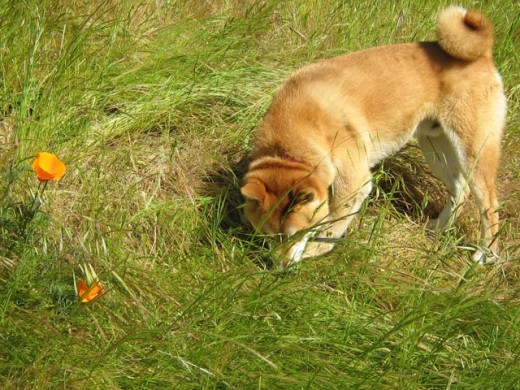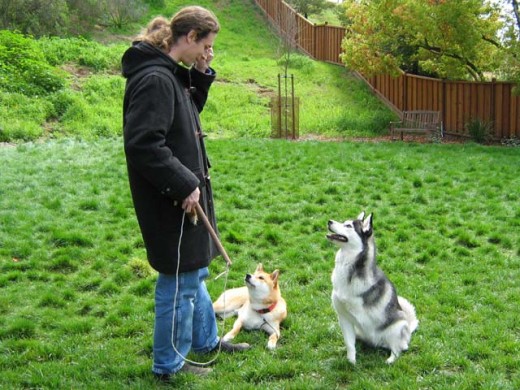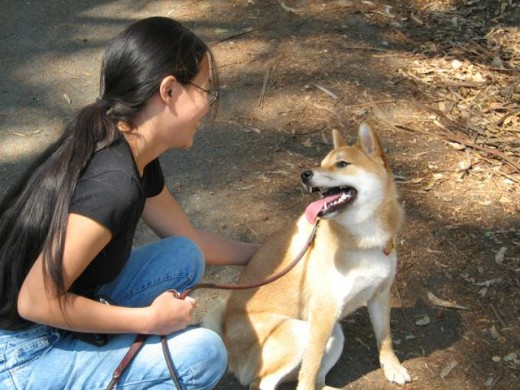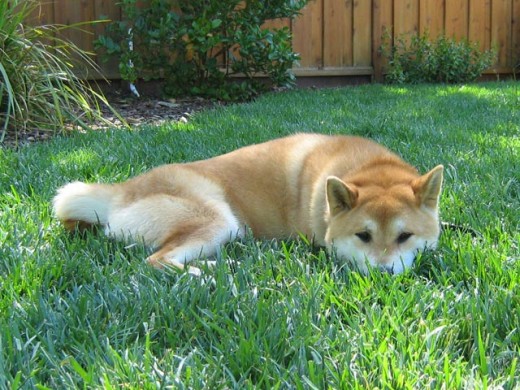Why do dogs eat poop?
Dogs eat poop for a variety of reasons including –
- Nutritional imbalance – When a dog eats his own poop, it may be because the stool still has undigested minerals and nutrients.
- Stress – A dog may poop because of extreme anxiety (e.g. when left alone), and then eat up his own feces as a displacement behavior.
- Boredom – Lack of activity and interaction may cause a dog to start playing with his stool and sometimes eat it.
- Enjoyment – Many dogs like the taste of leavings from cats or other animals. My dogs also like smelling the stuff and scenting it with their tongue.
- Clean-up – Some dogs may eat poop inside the house to keep their living space clean. Dogs that are physically punished for potty training mistakes, may learn to eat their own poop to avoid our anger or strong discipline.
- Any combination of the above.
Whether eating feces is harmful to our dog will depend on whether it is contaminated with worms, fleas, or other parasites that may carry bacteria and viruses. The consequences of eating contaminated feces will also depend on the immune system and general health of our dog. Young puppies, for example, have developing immune systems, and may be more susceptible to bad stool; especially if they have not been fully vaccinated. To be safe, I only take my puppy out on hikes and neighborhood walks, after he has received all of his vaccination shots.
The most effective method to stop our dog from eating poop, will depend on the reason for his behavior, his temperament, as well as our own preferences.

1. Feed our dog a healthy and balanced diet.
The easiest balanced food to give our dog is dry kibble. Dry kibble is nutritionally balanced and results in less teeth tartar.
Make sure to get a high quality kibble, with good protein sources, and no unhealthy fillers.
Some well reviewed kibble brands include Wellness CORE, Blue Wilderness, Nature’s Variety Instinct, and Orijen.

2. Fixed feeding schedule and on-leash supervision.

If we keep our dog on a fixed eating schedule, it will help keep his poop schedule regular and predictable as well.
A fixed schedule makes it easier for us to supervise our dog, and prevent him from eating his own feces or those from our other dogs.
During poop time –
- I put the problem dog on a leash, and walk him out on-leash to do his business first.
- If he tries to eat his own feces, I no-mark him (Ack-ack) and lead him away from it. I get him to do some obedience commands, and then try again. If he does not try to pull towards the bad stuff, I praise him and reward him well.
- I keep sessions short, and end on a positive note.
- I make sure to clean up after him.
- If we have other dogs, only let them out after cleaning up.
- Make sure to keep the problem dog on-leash, so that we may supervise and prevent poop eating when our other dogs are out.

3. Keep our dogs busy and well-exercised.
Bored dogs will frequently develop behavioral issues and cause property damage.
It is important to walk our dog regularly (preferably every day), and to provide structured, interesting activities, to keep his mind sharp and engaged.
My dogs work for all of their food, either by performing dog obedience commands, or through interactive food toys. If we provide a lot of alternative activities for our dog, he will be less likely to find unacceptable entertainment on his own, including eating his own feces.
If we are busy in the short-term, and do not have the time to give our dog the attention that he needs, consider sending him to dog daycare or hiring a pet sitter.

4. Keep our dog’s environment clean.
Scoop up after our dog, as soon as he is done with his business. If we keep things clean, there will be less chance for him to engage in opportunistic poop eating.
During retraining, it is also important to supervise our dog closely, so that he does not practice any bad behavior on his own. We may have to go back to dog potty training basics, to fully stop him from eating his own poop.

5. Help our dog reduce stress.
Identify situations that cause extreme stress in our dog, and try to reduce the number of stressful encounters. In the meantime, practice managed desensitization exercises, to help reduce his stress response.
To desensitize my dog-
- I make sure that I am in control of the training environment. Then, I start by exposing him to very low levels of the stressful stimulus. Low enough that he is able to stay calm and learn.
- I treat and praise him for staying calm.
- I do some simple obedience commands (e.g. Sit), so that he is focused on me, and looks to me for direction while under stress.
- When my dog is comfortable with the low-level stimulus, I very slowly increase its intensity, and repeat the focus and training exercises.
If our dog starts to react badly, then we have moved forward too quickly. I move a few steps back, help my dog to calm down, and then do some simple focus exercises so that I can end on a positive note.
While conducting desensitization exercises, it is important to keep sessions short, fun, and rewarding for our dog. In this way, he will begin to re-associate the bad stimulus with positive experiences.

6. Teach our dog the ‘Leave-it’ command.



- First, I get some yummy treats that my dog likes.
- I put one treat in my hand, and make sure my dog knows it is there.
- I close my hand into a fist, and hold it still.
- My dog will naturally nose all over my hand, while trying to get to the treat. I say Leave-it, and wait for him to briefly stop nosing my hand.
- As soon as he stops, I mark the behavior (Yes), and treat him from my other hand.
As our dog learns the command, we can slowly lengthen the time he has to leave our hand alone, before we mark and treat him.
Once we are comfortable with this exercise, we can practice the Leave-it command with a treat on the floor. Make sure that we are fast, or have our dog on a lead. In this way, we may stop him if he decides to lunge for the treat. If necessary, we can also cover the treat with our hand.
As soon as our dog leaves the treat alone, mark and treat him from our other hand. It is important NOT to give him the treat that is on the floor. This may inadvertently teach him that he gets rewarded with whatever is on the ground, which is often not the case in real-world situations.
Keep practicing this until we have a really solid Leave-it command. Now, we can use it when our dog gets tempted by animal leavings during walks.
Note that independent minded dogs may choose to eat the feces anyway, if they decide that our reward is of lesser value. If this happens, I try upgrading my rewards, and make sure that my dog does not get within striking distance of the bad stuff. In addition, I quickly march my dog home and end the walk, if he manages to sneak in some poop eating. This teaches him that if he eats the stuff, the nice and interesting walk ends. That is usually enough of a deterrent to stop any roadside temptations.

7. Make the dog poop taste bad.
Adding meat tenderizer containing papain, in small quantities to our dog’s food, will sometimes prevent poop eating. Make sure it does not contain other additives such as MSG or salt. Some people also suggest adding pumpkin, pineapple, or stool deterrent supplements as alternatives. Our vet can also give our dog medicine, that will make his stool taste extremely bitter.
Only use one additive at a time, so that our dog’s digestive system does not become overly unbalanced.
Remember to consult with our vet, before using any of these additives. Adding too much, may give our dog digestive issues. Some dogs may also be allergic to the added ingredients.
Instead of adding to our dog’s food, we may also coat our dog’s poop with taste deterrents such as Bitter Apple.
Note that taste deterrents are added to the feces, and *not* to the food.
However, stool deterrents only work when our dog is eating his own feces, or those from other dogs in the house. Results are usually much better and longer lasting, when we correct the source of the poop eating behavior, through the other methods listed above.

my dog he is a pit bull he eats his own poop and i dont know what to do he dose not feel like eating and he looks strange evry thing he dose is not normal please tell me what to do please help me.
If my dog is not eating normally or not acting normally, the first thing that I do is take him to the vet to make sure that everything is ok physically.
How long have you had your dog? When was he last at the vet? When did he start not wanting to eat? What food do you feed him?
My dog eats his own poop and I am about to give up I don’t know wat to do
Hello,
One month ago we bought Akita Inu puppy. We realised that our dog is eating own stool. We tried to forbid, and give some medicines, but it did not work. Also our dog has worms, we are giving medicines and it is so difficult when she still eating it…… i don’t know what to do. My family had two dogs, but we never had such a problems.
How old is the puppy? What food is the puppy currently eating? What kind of worms does the puppy have? What is puppy’s daily routine?
With my dogs, close supervision is needed so that I can be there to teach them not to eat their own poop or poop from other animals. I talk more about what I do in the article above.
My puppy is 3 months old. She is eating good food, it is Brit Care food.
Our veterinary said that worms is Toxacara Canis. Now we are giving her some medicines from it.
She is very active dog, we are spending a lot of time together and when we are in a separate room she starts to eat her poop. Looks like she is doing it only when she is alone.
When you are in a separate room, can she come to you if she wants to? Or is she in an enclosed space? Does she show any other behavior when she is alone, e.g. whining? Is she being potty trained? How is she being potty trained?
Dogs eat their own poop for a variety of reasons, including stress (e.g. separation anxiety) or to clean up their living space. The more I understand the source of my dog’s behavior, the better I can help him cope with the underlying issues.
Because we are not going outside yet, so we are doing our potty at home. She has the place, where she is doing it all the time.
Now we had second vaccinate and looks like now she has no worms anymore.
In the house we are not closing the doors in any room, so she can come anytime. Just when we don’t see she is eating her stool.
With my dog, it helped to put him on a fixed schedule during the potty training period. In this way, his poop schedule is also more regular and I can clean up after him right after he poops.
During the potty training period, I also make sure to supervise my puppy all the time. If I am not able to supervise even for 1 minute, I put him in his crate for a short time. Here is more on how I potty trained my dog.
Supervision is necessary because in order to change behavior, I need to catch the behavior, no-mark, and show my dog what to do instead. I want to maximize success and also minimize failures because the more successes we have, the more opportunities I get to reward my dog for doing the right thing. On the other hand, the more my dog practices an undesirable behavior, the more it will become a habit.
I’m really getting sick of one of my Yorkie eating the cat poo that my neighbors cat leaves in my yard. Can I put vinagir on my yard to make him stop ? Or does someone have advice for me ? It’s just gross
What works best for my dogs is to manage their environment and train them not to eat poop. I do “Leave-It” exercises with them, and if they try to eat poop during our walks, I march them home right away, and end the walk. In this way, they learn that –
Eat poop = Fun and exciting walk ends,
Don’t eat poop = Walk continues and fun continues.
After I ended the walk a few times, my dog stopped eating poop. I continue to be vigilant so that they don’t sneak in any secret poop treats or a roadside surprise. The key is to catch the behavior early (before it becomes a habit) and to be consistent about consequences. I talk more about “Leave-It” and what I do in the article above.
If we want to use taste deterrents, we will have to be very consistent about it as well. In addition, a dog may learn to just avoid poop that smells like the taste deterrent, and eat the ones that don’t. Here is an article from the ASPCA about taste deterrents-
http://www.aspca.org/pet-care/virtual-pet-behaviorist/dog-behavior/using-taste-deterrents
My puppy 8 mos.old @ first ate his own poop, but now he eats other dogs (we take long walks multiple times a day). He is now eating deer poop which is “plentiful ” in national park here in Cleveland and im afraid of some feral diseases!! He’s had all his shots …should i be concerned?
I am very strict with my dogs about *not* eating poop. If they try to eat poop, I end the walk right away. In this way, they learn that –
Eat poop = End of exciting walk,
Don’t eat poop = Walk continues, get to stop and smell the roses, plus other rewards.
My dogs really love their walks so after ending the walk a few times, they totally stopped eating the stuff. I make sure to stay vigilant so they don’t slip in any stealth poop. The less they practice the behavior, the less they are likely to repeat it, and the less it becomes a habit.
In terms of whether our dog can get sick from eating poop, that would depend on the animal it came from. If the animal is sick or a carrier, then its poop may have worms, or may carry other bad parasites. As I understand it, it also depends on how recent the poop is, and the type of parasite. Some die pretty quickly, while others may stay around for a while, some parasites may not affect dogs, and some will. It depends.
How is your puppy’s energy level? How is his appetite? Is his stool and urine normal? I would consult with a vet if I suspect that my dog may be sick.
I have a pekishu puppy and the problem that I am having is he eats his poop and I will take him outside to use the bathroom but as soon as I bring him back in the house he uses the bathroom in the house. What can I go about this behavior?
What has helped with my dogs is to potty train them so that they only do their business outside. If they make a mistake inside the house, I make sure to clean it up right away, so that they do not get into the habit of eating their own poop.
Here is more how I potty trained my dogs.
I have a shiz-tzu puppy and she eats her poop. I have tried the tenderizer and she is on the tablets now but she continues to eat her poop. But the weird thing is that she will turn her nose up at it when she goes outside but if she goes in the house she almost always eats it. I’m at my wits end with her and so frustrated. Please help me….
Dogs will sometimes eat poop as a way of cleaning up their den (house). What helps most with my dogs is to potty train them so that they go outside, and to clean up their poop as soon as they go. I talk more about what I do in the article above.
My 5 year old schnauzer has NEVER eaten poop. The next door neighbor’s dog always eats poop. My dog is good friends with the neighbor’s dog and today my dog “bolted out the door” to see the neighbor dog who was outside. I saw my dog greet the neighbor dog and then run and eat poop. I think my dog has “learned this behavior” from the neighbor dog. I immediately went to my dog and looked in his mouth and beard. I took him by the collar and walked him in the house. Once inside, I put him in bathtub and scrubbed his face and front paws. I made him “sit/stay” after out of tub, he knew I was most upset with him. How can I make sure my dog does not follow the bad habits of the neighbors dog? Short of banning him from ever playing (off leash) I don’t know what else to do?
Does he only eat poop when he is with the other dog?
With my dog, I identify the situations where they show poop eating behavior. In Lara’s case, it is usually cat poop which is only available during walks. Therefore, I make sure to supervise her closely during walks. If she goes near poop, I give her the “Leave-It” command which I have pre-trained. If she manages to eat some poop, I no-mark and then march her home quickly. In this way, she learns that –
Eating poop = End of fun walk,
No eating poop = Get rewarded well and fun walk continues.
Hello! I have a 5 month old black tan shiba. She is super smart and non destructive however she has one big flaw, she’s a poop eater!! And it is so digesting!! I have supervised, given her the deterrent tablets, the powder, and I pick up her poo as soon as She’s done. However the moment I don’t watch her she sneaks and eats it I guess because I look at the porch and no signs of poo just the streaks. :/ I dot understand why she does it. She sleeps in a kennel and some nights I let her sleep out on her doggie bed b the door of my room. And If she needs to pee she has a puppy pad. But I don’t know what to do with her. I picked her up Saturday from the boarding house since I was on a trip where I couldn’t take her. And she was very mellow throughout te weekend and not eating much but last night around 11 she started gagging constantly and she vomited literally poo! It was the most disgusting thing I’ve ever seen!! I felt sick for her and for me because it smelled so awful as I’m afraid she’s going to intoxicate herself with all that bacteria from the poo. She threw up twice and after went straight to her kennel and vomited there a little too an then she wouldn’t come out. She knew throwing up in her crate is a big No No, I cleaned it up and sanitized the area and he came out afterwards and was all happy go lucky! She apparently needed to throw up! But I’m getting so upset with this bad habit of hers. I know I have to take her to vet to get her rabies shot an need to explain to her all of this again. Bella Paris has been doing this since te day I brought her home from a pet store. PLEASE HELP! any suggestions tips??!
Yeah, pet store puppies can have this issue because they mostly come from puppy mills and are kept caged for much of the time. As a result, they may get used to soiling their crate, and may engage in poop eating behavior out of boredom, stress, and more.
I always take a new puppy to the vet as soon as possible to make sure she is healthy and for her vaccination shots. This is especially important for a pet store puppy where there is little attention given to health, or genetic attributes of the parents.
Here is more information from the ASPCA on puppy mills and pet stores-
http://www.aspca.org/PUPPYMILLS
In terms of poop eating, I would go back to potty training basics. During potty training, I watch my puppy like a hawk and take her out every time to do her business. I *always* go out with her so that I can reward her *very very well* for doing her business outside and pick up her poop.
Here is more on what I did to potty train my puppy.
We have the opposite problem. Our neighbor lets her dog crap in our yard, all the time; and she could care less. My kids play out there and have to worry about dog mines, and we don’t even have a dog. What is going to be the most flavorful “topping” to sprinkle on the dog crap? I have heard bacon grease, or A1 sauce works good. I plan on putting up a sign, just to inform the neighbor; as to what her dog is eating…. can’t wait to see her reaction. Should bring a quick end to it….